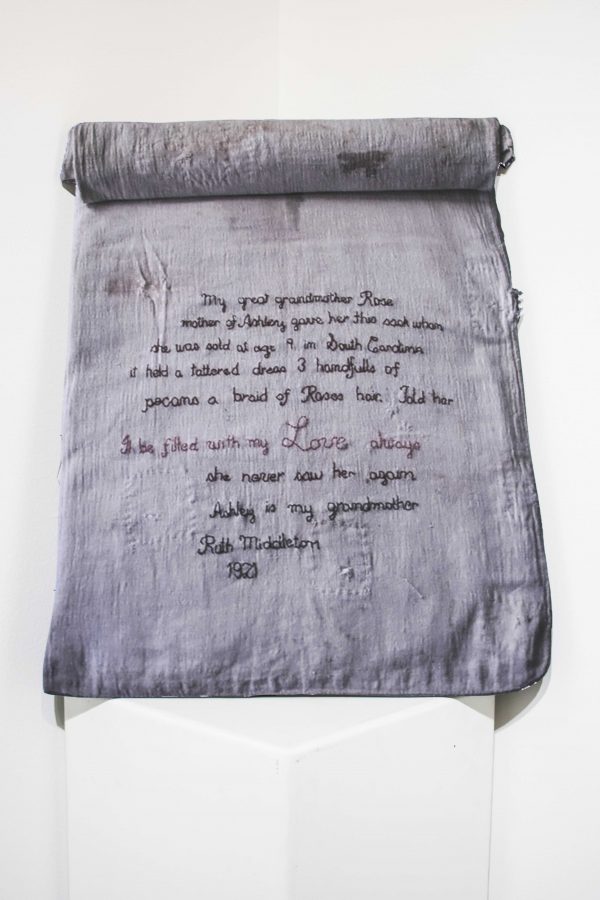‘Ashley’s Sack’ gathers national attention
March 1, 2017
An associate professor of anthropology and museum studies research on a rare and exciting story was published in USA Today. Mark Auslander was challenged by his students to uncover the story on Ashley’s Sack.
The historical artifact was nationally noticed when it appeared at the National Museum of African American History and Culture, but surprisingly it had no recorded history or providence. The only information that the museum had was that the sack was bought at a flea market in 2007 by a woman in Springfield, Tennessee.
Ashley’s Sack is a 150-year-old tan cotton sack with brown, red and green stitching. The artifact mentions three people: Rose, Ashley and Ruth Middleton.
The first five lines are written in brown: “My great-grandmother Rose, mother of Ashley gave her this sack when she was sold at age 9 in South Carolina. It held a tattered dress, 3 handfuls of pecans, a braid of Roses hair.”
The next line is sewn in red thread: “It be filled with my Love always.” The final line is in green: “Ashley is my grandmother, Ruth Middleton 1921.”
To uncover the complete story of Ashley’s Sack, Auslander conducted over a year’s worth of research. During this time, he searched through thousands of documents attempting to find information on the Rose, Ashley and Ruth mentioned.
Auslander found that Rose was one of the most common names in the south at that time. However, the name Ashley was not common for the mid-1800s.
He was able to trace back the mother and daughter connection of these women from wealthy wagon trader named Robert Martin. Martin owned a woman named Rose and lived in Charleston, South Carolina around the same time the sack was created.
Martin, being a wealthy trader, owned several properties at the time and it appeared that Ashley was moved to another property that was 40 miles south of Augusta, Georgia.
The connection of these two women was confirmed in the South Carolina state archives that listed every slave Robert Martin owned. The archive was organized family by family and on the seconded page, it listed Rose and Ashley together.
After Auslander discovered a major component of the story behind Ashley’s Sack, he then researched the final name on the sack, which was Ruth Middleton.
He started his research by analyzing the 1920 census, but none of the Ruth Middleton’s that appeared would match the history of Ashley’s Sack. Auslander realized that Middleton could be a married name.
He quickly went through marriage records and found a Ruth Middleton in Philadelphia. This Ruth Middleton had the maiden name of Ruth Jones and was born in Columbia, South Carolina.
She was married to Arthur Middleton in 1918 and several weeks later he was drafted for WWI. Years later, with a young child and divorced from her husband, Ruth made the decision to sew her name on the sack.
Ashley’s Sack appeared at a flea market several decades later because it was said that all of Ruth’s belongings were donated after she passed away.
Auslander believes his research is important for several reasons.
“It reminds us in a personal and visceral way about the horrors of slavery. The thought of a little girl who’s name we know and who left an object, that has been passed on for generations, that has the power to move people.” Auslander said.
Auslander also gave another reason for the importance of Ashley’s Sack.
“The whole story indicates the power of family. Everything about slavery ruptured the African American family. The strength of holding on to these families, up against all odds, so much so that in 1921 Ruth Middleton herself could take this object that been passed down,” Auslander said.



Larry Ashby • Jun 18, 2017 at 4:09 pm
Blacks used to buy and sell slaves in America, too, boys and girls. Black people bought and sold black people between 1654 and 1865–more than 200 years–right through the Civil War. Of course, there’s not a well paid university prof who would dare bring up this little fact. Educator research today–if any–is very selective. After the Civil War it was Republicans (dirty word) who demanded that all former slaves be given citizenship and be allowed to vote in local, state, and national elections. By the way, kids, it was the Democrat Party who created and organized the Ku Klux Klan. Of course, we realize this is hate speech. The truth usually is.